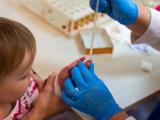Oct 27, 2011
Study says flu epidemics bring increase in children's febrile seizures
Australian researchers say seasonal influenza epidemics are accompanied by a "substantial and statistically significant" increase in emergency department (ED) visits for febrile seizures in children under 6 years old. The authors studied the relationships between the incidence of febrile convulsions and seasonal flu and respiratory syncytial virus (RSV) epidemics in Sydney, according to their report in BMC Infectious Diseases. They used government databases to gather information on ED visits from January 2003 to April 2010 and ambulance dispatches for July 2006 to April 2010. In addition, they assessed the incidence of ED presentations for influenza-like illness (ILI) and bronchiolitis, as proxy indicators of flu and RSV. The main findings were that when the weekly all-age population incidence of ED presentations for ILI increased by 1 per 100,000, the incidence of ED presentations for convulsions in 0- to 6-year-olds increased by 6.7 per 100,000 (P < 0.0001) and that of ambulance calls for convulsions in that age-group increased by 3.2 per 100,000 (P < 0.0001). An increase in ED presentations for bronchiolitis in young children was associated with a much smaller but still significant increase in ED visits for convulsions but not with a significant increase in ambulance calls for convulsions.
Oct 26 BMC Infect Dis report
CDC discontinues use of botulism vaccine for at-risk workers
The US Centers for Disease Control and Prevention (CDC) said today that it will no longer provide the investigational pentavalent botulinum toxoid (PBT) for vaccinating workers at risk for occupational exposure to botulinum serotypes A through E. In a Morbidity and Mortality Weekly Report (MMWR) notice, the agency said the decision was based on data showing declining immunogenicity for some of the serotypes, as well as a rise in moderate local reactions after booster doses. PBT has been available since 1965 as an investigational drug for at-risk workers. It will not be available as of Nov 30. The CDC said, "This change might affect persons working in public health laboratories, research facilities, and manufacturing institutions who work with botulinum toxin or neurotoxin-producing species of Clostridium." The agency said the declining immunogenicity may be related to the vaccine's age.
Oct 28 MMWR notice
Rotavirus outbreaks highlight risk in older populations
Two outbreaks of rotavirus illness in separate retirement communities in Cook County, Ill., earlier this year underscore the need to watch for the disease in older populations, according to another MMWR report today. CDC and local officials said that one outbreak started in February, hospitalized 10 people, and had an attack rate of 22% for confirmed or probable cases. The second outbreak, which began in May, affected 11% of retirement community members and hospitalized 20. Each outbreak lasted at least 4 weeks but did not involve deaths. The report said that the disease—which is more commonly associated with young children and causes acute gastroenteritis—was likely transmitted from person to person via contaminated hands or surfaces. The authors write, "Health professionals who care for elderly persons in residential facilities or who investigate diarrheal disease outbreaks should consider rotavirus as a possible cause of acute diarrhea, especially during the months when rotavirus circulates (usually January to June)."
Oct 28 MMWR report
DR Congo launches massive polio vaccination campaign
Thousand of vaccination teams have spread throughout the Democratic Republic of the Congo (DRC) in recent days in a campaign to immunize at least 14 million children against polio, according to IRIN News, the United Nations' humanitarian news service. The campaign began Oct 20 with support from the UN Children's Fund (UNICEF). "We must do our best to reach all boys and girls with the vaccine," said Granga Daouda, head of UNICEF's vaccination campaign in the country. "Our goal is to eradicate polio," added DRC Health Minister Victor Makwege. UNICEF said the DRC has improved its polio vaccine uptake from 10% in 2001 to 42% in 2010, but most gains have come in middle- and high-income families. The country has confirmed 85 polio cases this year, according to IRIN. An Oct 20 report from the Global Polio Eradication Initiative (GPEI) listed the nation as third in polio cases in 2011 thus far, behind Chad and Pakistan.
Oct 26 IRIN story
Oct 20 GPEI report
TV show spoof wins CDC preparedness video contest
A video spoofing the popular MTV reality show Jersey Shore took top honors in a CDC-sponsored preparedness video contest as part of September preparedness month activities. The CDC revealed its top picks yesterday on its Public Health Matters Blog. The video was made by New Jersey's Burlington County Health Department and features characters based on Jersey Shore cast members making plans to prepare for a hurricane, a real-life event that affected the area in August. The video characters translate preparedness messages into show-inspired slang, such as the phrase GMB ("Get a kit, Make a plan, Be informed). The CDC said despite the light-hearted approach, the video communicates key preparedness messages. Honorable mentions included a video that incorporated the CDC's "Zombie Apocalypse" preparedness theme, one that featured the Cerro Gordo County (Iowa) Department of Public Health's owl mascot, Howie Staywell, and another that featured images from Japan's tsunami. The CDC had announced the video contest in August. Entrants were asked to make a 60-second video that reinforces the CDC's key preparedness message to "Get a kit, make a plan, be informed."
Oct 26 CDC blog post



















